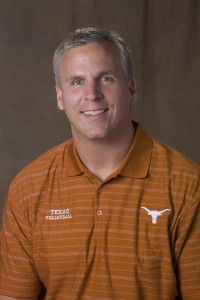
Donnie Maib
Family: Wife – Karen
Children – Isabel, Anna, Evelyn, and Olivia
Strength and Conditioning Coaching Career:
-University of Colorado (1994-97)
-University of Texas (1998-Present)
FCA Staff Quote:
“It’s awesome to see Donnie’s passion for the Lord as he works with the FCA Huddle at the University of Texas. He has a great way of communicating through humor and his personality, but what makes him most effective is his relationship with the athletes. They listen to what he has to say because they see him live it out every day.”
– Jake Ridley
Area Representative
Austin, Texas
Originally Published: July 2012
“Let us not become weary in doing good, for at the proper time we will reap a harvest if we do not give up.” – Galatians 6:9
While his work may not generate headlines in local newsfeeds, University of Texas strength coach Donnie Maib knows the importance of his behind-the-scenes role in the Longhorn athletic department. Every day he works to prepare athletes for competition, and it’s a task he cherishes along with building relationships with each player who crosses his path. Maib has learned that, in the heart of training, he is able to show—and often speak—the love of his Lord and Savior Jesus Christ.
FCA: Why did you choose to be a strength and conditioning coach?
DM: I was a gym rat at the University of Georgia where I played football. I had a real passion for lifting weights and conditioning, and I saw how much of an impact the gym made on my abilities as an athlete.
I originally saw myself coaching, but I knew it would really limit my time with my family. I pursued a career as a strength coach because I could still have an impact on athletes while maintaining regular hours at work and at home.
FCA: Which athletic teams do you work with at UT?
DM: I primarily work with our women's volleyball, women’s soccer and men's tennis teams. But my role also offers me the opportunity to work and develop relationships with almost all of our athletes, rather than working with a specific number of athletes on a given team.
FCA: Do you see this job as a ministry opportunity?
DM: I’ve told my boss that the weight room is my mission field. In my opinion, the burden to reach people shouldn’t be just on pastors; it’s on us, the lay people. We’re out there as coaches, teachers, doctors and business people, and we can make a huge impact.
As coaches, we’re leading kids through one of the most impressionable times in their lives, so we need to take a stand and say, “Here’s how we should lead and make a difference.” We can build relationships with these kids and love them no matter what kind of lifestyle they live. Through that unconditional love, they begin to trust and listen, and it opens a small window of opportunity for us to plant seeds in their lives.
FCA: How has being an ordained minister impacted your life and career?
DM: Years ago, I didn’t think I would be as passionate about teaching God’s Word as I am now. I had a radical transformation in my life in which I gave my heart completely to the Lord. I’d grown up in a Christian home, but it wasn’t until then that I became fully committed to living for God and studying His Word. I got plugged into a church and became the spiritual leader in our family. My subsequent ordination was just a confirmation of what God had already been doing in my life as a husband, father and coach.
FCA: What’s the most rewarding part of being a coach?
DM: When kids come back and thank us for what we did for them—how we helped them through sound advice and counsel during an important time in their lives. As a coach, I’m not necessarily responsible for bringing athletes to the Lord, but I am responsible for planting seeds in the moments when their hearts are soft.
Photos courtesy of the University of Texas